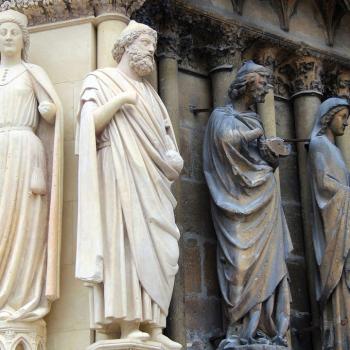Tribulation Force, pp. 268-274
“It ain’t over ’til you both get your cookies.”
— Old Man Dunphy
Having established cookies as the symbol and talisman for Buck and Chloe’s repressed sexuality, the following short vignette gets a bit squicky.
Rayford … lifted the small cookie bag from the counter. One left, he thought, and was tempted. Instead he wrote Chloe a note. “Hope you don’t mind, I couldn’t resist.” On the back he wrote, “Just kidding,” and laid the note atop the bag.
Chloe was saving that cookie for the man she intends to marry, so see nearly bursts into tears when she finds her father’s note later. In Rayford’s defense, he has know no way of knowing this is a Symbolic Cookie representing his daughter’s virginity, so he is himself innocent of the very creepy and disturbing implications of his little joke. But what on earth were the authors thinking?
Buck, meanwhile, is on a flight to New York, seated next to Cardinal Mathews, the subject of the first actual physical description provided by Jerry Jenkins.
Mathews was in his late fifties, a beefy, jowly man with close-cropped black hair that appeared to be his own natural color. Only his collar evidenced his station.
Just a simple priestly collar, apparently, with the words “No. 1 Cardinal” embroidered in rubies.
“Why didn’t you tell me you were a candidate for the papacy?” Buck began.
“So, we’re just going to jump right into it, are we?” Mathews said. “Don’t you like a little champagne in the morning?”
I can’t claim to be an expert on the decadent indulgences of wealthy corrupt elites, but Jenkins’ assumption that the uber-class starts its day with a morning glass of champagne seems implausible. I can imagine a Nora-Desmond type refusing to get out of bed until her servants bring her a mimosa, but champagne seems off for a man like Mathews (whom I picture as played by Eugene Pallette). Buck, a teetotaler even before his conversion, declines the bubbly.
“Well, you won’t mind if I have a little pick-me-up.”
“Suit yourself. Tell me when you’re available to chat.”
The pattern by now is clear — this is Buck’s standard approach to interviews. This rude diffidence seems an odd approach. Making one’s interview subjects more guarded and hostile isn’t usually the best way to get them to open up and speak candidly.
We’re meant, I think, to view Mathews as ridiculous. Like most of the villainous leaders in this series, he is portrayed as repugnant, uncharismatic and transparently self-seeking. The authors seem reluctant to provide their villains with any charm or redeeming characteristics. It’s as though they don’t trust readers not to be taken in by a villainous character who is in any way interesting or attractive. The effect of this is to make readers wonder how such clearly loathsome people ever became leaders in the first place. Who would ever choose to follow them? (The one exception to this in these books is Nicolae, who also comes across as a charmless, uncharismatic and repugnant buffoon, but at the same time the authors are portraying him as such they’re also endlessly telling us that he is actually incredibly dynamic and charismatic.)
Mathews is allowed one gracious gesture in these pages, but neither the authors nor Buck views it that way. The pompous cleric greets the flight attendant by name:
“Thank you, Caryn,” he said, as if to an old friend. Apparently she was. When she was gone he whispered, “The Litewski family, from my first parish. Baptized her myself. She’s worked this flight for years. Now where were we?”
Buck did not respond. He knew the cardinal had heard and remembered the question. If he wanted it repeated for his own ego, he could repeat it himself.
Again, if Buck actually was a journalist who actually was conducting an interview, he would pounce on an opening like that. The man who is soon to become the next pope just mentioned his first parish. Now’s the chance to ask him about his first years in a local pastorate, about his call to the ministry and his early lessons, struggles, doubts and aspirations. But Buck isn’t interested in any of that, particularly not if exploring it would mean abandoning his sullen, laconically hostile interview style.
It’s almost as though Buck here realizes that this little detail about Caryn Litewski didn’t need to be pursued because it was nothing more than the authors’ device for taking a potshot at Roman Catholics. It’s their way of reminding readers that Catholics are not real, true Christians. They may foolishly believe that their infant Baptism and confirmation and sacraments will save them, but they haven’t said the magic words. Catholics, according to the authors, believe they can be saved by good works, when what really saves us is intellectual assent to proper soteriological propositions. Caryn Litewski will soon die as she deserves. She will be killed in the earthquake, or poisoned by Wormwood, or be slain by pestilence or famine or giant demon locusts. And then she will burn forever and ever in Hell, just like her fellow Papists at that food pantry/health clinic/shelter downtown. Reminding readers of that was the whole purpose of her brief appearance in this story.
“Oh, yes, you were wondering why I didn’t mention the papacy. I guess I thought everyone knew. Carpathia knew.”
I’ll bet he did, Buck thought. Probably engineered it.
Another odd feature of this series of books is the main characters’ enduring suspicion of Nicolae Carpathia. Throughout the rest of this book and those that follow, they will suspect him of secretly orchestrating everything as though he were some kind of all-powerful, behind-the-scenes global dictator. And they will retain this suspicion even long after he declares himself openly to be a center-stage all-powerful global dictator. Long after all of Bruce’s prophecies and warnings about Nicolae have been realized, they will continue muttering things like, “I’ll bet Carpathia is behind this somehow!” It’s as though they never fully grasp what “Antichrist” means here.
Mathews assures Buck that his election is a done deal:
“You know what Nicolae calls me? He calls me P.M.”
Buck shrugged. “He calls you by your initials? Is there some significance?”
… “Pontifex Maximus,” Mathews beamed. “Supreme Pope.”
Buck is appalled at the man’s vast ego, but Mathews isn’t done. He says the papacy is just the first step in the grand scheme he and Nicolae have. He offers Buck an exclusive preview of their plans which won’t be revealed to the rest of the media until a press conference hours later. That’d be a nice scoop for Buck if he didn’t work for a weekly publication with an apparent three-week lead time. Plus Buck never writes about these scoops anyway.
“Why would you do that?” Buck asks of this offer for inside information.
“Because I like you.”
“You hardly know me.”
“But I know Nicolae.”
Buck sank in his seat. “And Nicolae likes me.”
“Exactly.”
“So this little ride-along was not really entirely the result of my legwork.”
“Ah, no,” Mathews said.
And now it’s Mathews’ turn to be appalled at the vastness of his counterpart’s ego.
Suddenly, we’re back at the Steele’s house, several hours later, where Rayford is calling to convey his usual thoughtful friendliness to Hattie Durham:
“Rayford Steele here.”
“Rayford! How are –“
“Let me get to the point, Hattie.”
This is the one instance in which any member of the Tribulation Force shows any End-Times urgency. Rayford realizes he only has, at most, around seven years left in which to be a total douchebag to Hattie, so he wants to make the most of every opportunity.
He arranges a meeting to speak with Hattie privately before his meeting with Nicolae that afternoon, then brusquely hangs up. Meta-Hattie surfaces briefly to sneak in one zinger:
“I should tell you in advance, however, that I am seeing someone.”
“That’s not funny.”
“I didn’t intend it to be.”
Rayford and the authors seem much more concerned about his pending encounter with Hattie than they are with his facetime with Nicolae. It’s the big showdown over the flowers and candy, after all. Buck, likewise, seems nonchalant about his appointment that same day with the Ten-Horned Beast from the Abyss. It wasn’t that long ago that these characters were all convinced that Buck only survived his conversation with Nicolae due to the defensive magic of their prayer shield, but now they just routinely hang out with the guy, imperturbed by his mind-reading and mind-control powers.
The big Nicolae/Mathews press conference comes on CNN at the Steele’s house and they gather to watch it — not out of any interest in what Nicolae will say, but in the hopes of catching a glimpse of Buck.
The CNN reporter recites some burdensome exposition in Jenkins’ usual very rough approximation of TV-news language:
We’re expecting a joint statement from the coalition of religious leaders and the United Nations, represented by new Secretary-General Nicolae Carpathia. He seems the man of the hour here, having helped hammer out propositions and pulling together representatives of widely varying systems of belief. …
Speculation here is that the religions of the world are going to make some fresh attempt at addressing global issues in a more cohesive and tolerant way than ever before. Ecumenism has failed in the past, but we’ll soon see if this time around there is some new wrinkle that can finally make it work. Stepping to the podium is Archbishop Peter Cardinal Mathews, prelate of the Cincinnati archdiocese of the Roman Catholic Church and widely seen as a potential successor to Pope John XXIV who served only a controversial five months before being listed among the missing in the disappearances just weeks ago.
So apparently, Mathews blew off the whole world religions conference, hanging out in Cincinnati until it finished its final agreement. Then he flew to New York to step in front of the cameras and pretend he’s in charge.
The rapturing of Pope John XXIV — the pontiff we’ve been calling Pope Calvin Zwingli I due to his apparent embrace of Reformed theology — is LaHaye’s olive branch to Catholics. It’s meant to balance out his condemnation and damnation of Caryn and Mathews and every other Catholic on earth. Or at least to insulate LaHaye from the charge of being anti-Catholic. It’s sort of a parallel to the way the authors think the character of Tsion Ben Judah insulates them from the charge of anti-Semitism. As long as Catholics like John XXIV agree to stop being Catholic, they can be redeemed, just as Jews like Tsion can be redeemed once they agree to stop being Jewish.
The key words in the above paragraphs, though, are “tolerance” and “ecumenism.” For L&J and their intended readers, these are unambiguously Bad Things. They may not know what those words mean, but they know they don’t like these things. They’re pretty sure tolerance must be bad, because they know they are good, and everyone keeps telling them they’re in-tolerant.
As for “ecumenical,” they mistakenly assume it must refer to some kind of solipsistic apostasy — a conspiracy plotting to undermine their faith. In LaHaye’s stream of American evangelicalism, a great deal of energy is spent railing against the creeping menace of ecumenism. LaHaye and his fellow anti-ecumenists allow for no distinctions between interfaith cooperation and the claim that all religions are interchangeable. The call for peaceful co-existence is, to them, the threat of assimilation into some indistinct one-world religion.
Their confusion on this point is honest and extreme. It’s reflected in the common insistence (particularly popular among tea partiers these days) that “the separation of church and state is a myth.” To them, there’s no difference between saying that all religions ought to be treated equally under the law and saying that all religions are the same. They thus advocate for the legal establishment of Christian privilege — prayer in schools, Protestant 10 Commandments plaques in courtrooms, the Christianization of the military, etc. “All religions are not the same!” they cry, demanding inequality under the law.
Observing this confusion and its ugly results, we’re confronted with a chicken-or-egg dilemma. Which came first? The chauvinism? Or the stupidity? It’s probably impossible to say. Both are on epic display in the stupidly chauvinist following section, which we’ll look at next week, wherein we’re given a glimpse of the weirdly impossible thing LaHaye imagines is meant by “ecumenism.”
The Steeles ignore all of this. They’re just trying to spot Buck in the crowd.
As Archbishop Mathews worked his way through to the bank of microphones, Rayford heard Chloe squeal.
“There’s Buck, Dad! Look! Right there!”
Buck is standing behind Mathews in the back of the crowded platform “where more than two dozen religious leaders from around the world, all dressed in their native garb, jockeyed for position.”
I believe it is possible to imagine cases in which the phrase “native garb” might be employed without sounding simultaneously condescending and parochial. This is not one of those cases. But I do think it is appropriate that Buck is standing apart from all the other reporters at this event. Those other poor saps, after all, are actually planning on reporting on it.
“What’s he got?” Rayford said. “Is that some sort of a notebook or tape recorder?”
Chloe looked close and gasped. She ran to the kitchen and returned with her cookie sack. “It’s his cookie!” she said. “We’re going to eat our cookies at the same time!”
Rayford tries to ask what she’s talking about, but Chloe is too caught up in the moment to respond. This is, apparently, the most romantic and erotic moment of her life.
“It smells just like last night!” she said.
Rayford snorted. “Just what did last night smell like?” he said.
Perhaps fortunately, Chloe doesn’t explain that last night, at the airport, Buck “opened her cookie sack and held it up to his face.”
Sure enough, as they watched, Buck quickly and quietly reached into his little sack, surreptitiously and almost invisibly slid out the cookie, put it to his mouth, and took a bite. Chloe matched him gesture for gesture, and Rayford noticed she was smiling and crying at the same time.
This book sold tens of millions of copies. I shudder to think how many thousands of those readers may have been young couples who attempted to imitate and re-enact this scene.
















